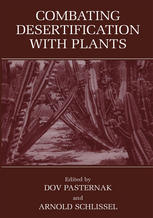

Most ebook files are in PDF format, so you can easily read them using various software such as Foxit Reader or directly on the Google Chrome browser.
Some ebook files are released by publishers in other formats such as .awz, .mobi, .epub, .fb2, etc. You may need to install specific software to read these formats on mobile/PC, such as Calibre.
Please read the tutorial at this link: https://ebookbell.com/faq
We offer FREE conversion to the popular formats you request; however, this may take some time. Therefore, right after payment, please email us, and we will try to provide the service as quickly as possible.
For some exceptional file formats or broken links (if any), please refrain from opening any disputes. Instead, email us first, and we will try to assist within a maximum of 6 hours.
EbookBell Team

4.0
16 reviewsThe conference "Combating Desertification with Plants" was held in Beer Sheva, Israel, from November 2-5, 1999, and was attended by 70 participants from 30 countries and/or international organisations. Desertification - the degradation of soils in drylands - is a phenomenon occurring in scores of countries around the globe. The number of people (in semiarid regions) affected by the steady decline in the productivity of their lands is in the hundred millions. The measures required to halt and reverse the process of desertification fall into many categories - policy, institutional, sociological-anthropological, and technical. Although technical "solutions" are not currently in vogue, the conference organizers felt that perhaps the pendulum had swung too far in the direction of "participatory approaches." Hence IPALAC - The International Program for Arid Land Crops - whose function is to serve as a catalyst for optimizing the contribution of plant germplasm to sustainable development in desertification-prone regions - felt the time was opportune for providing a platform for projects where the "plant-driven" approach to development finds expression. Some 45 papers were delivered at the conference, falling into the categories of this volume: Overview, Potential Germplasm for Arid Lands, Introduction, Domestication and Dissemination of Arid Land Plants, Land Rehabilitation, and Mechanisms of Plant Transfer. The conference was funded by UNESCO (Division of Ecological Sciences), the Ministry of Foreign Affairs of Finland, and MASHAV, Israel's Center for International Development Cooperation.